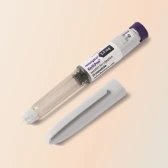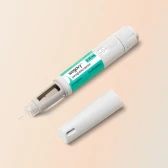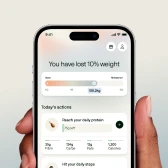Ashtary-Larky, Damoon, et al. “Rapid Weight Loss vs. Slow Weight Loss: Which is More Effective on Body Composition and Metabolic Risk Factors?” International Journal of Endocrinology and Metabolism, vol. 15, no 3, 2017:e13249 https://pmc.ncbi.nlm.nih.gov/articles/PMC5702468/.
When trying to lose weight, it’s easy to get hung up on the numbers on the scale. If you’ve been there—we get it, trust us!
But those numbers aren’t the whole story. They measure the total amount of weight lost, not how much fat. And it’s fat loss in particular that’s beneficial for your health.
That’s why fat loss, rather than overall weight loss, can be a more helpful goal to work towards. So, what’s the difference between the two? Read on to find out.
What is weight loss?
Weight loss is the overall reduction in your body weight. It’s a catch-all term that doesn’t distinguish where the dropped weight has come from—that is, whether you’ve lost muscle, fat, or water.
What is fat loss?
On the other hand, fat loss is a reduction in body fat only. It doesn’t include any losses in water or muscle mass.
Ideally, you want to lose fat while preserving muscle. Your muscles play a super important role in keeping you strong and healthy.
A drop in lean muscle mass can disrupt your metabolism, lowering the amount of energy your body uses. It can also increase your risk of injury, cause fatigue, and diminish your muscle function. If you’re curious about how weight-loss injections affect muscle, see our guide on muscle loss on GLP-1s.
Reducing your body fat contributes to the health benefits that are associated with weight loss—like a reduced risk of heart disease—without affecting your muscles.
Can you lose fat without losing weight?
Yes, if you’re gaining muscle at the same time. It’s possible for the muscle you build to make up for the weight dropped from lost fat—and therefore, the number on the scale might stay the same.
Key differences between weight loss and fat loss
Now let’s take a deeper look into the differences between losing weight vs losing fat.
Body composition
The two terms refer to different changes in your body composition. Weight loss is the total amount of weight dropped, whether that’s from fat, muscle, or water. Whereas fat loss is specifically referring to the amount of stored fat you’ve lost.
Losing fat takes longer
Most people tend to lose weight quicker at the start of their weight loss programme, usually during the first few weeks. That’s because initially, you’re mostly losing water.
After that, you’ll shift weight more gradually. Fat loss happens at a much slower rate. This is totally normal and doesn’t mean that your plan has stopped working!
Health benefits
We’ve covered this one above, but to give you a quick refresher: Your muscles keep your body working at its best, so it’s better for your health to lose fat while preserving muscle mass.
Appearance
Shedding fat while keeping your muscles intact might also give you a more toned appearance. Whereas with weight loss you might look a bit thinner or smaller in general.
Best ways to measure fat loss vs weight loss
But how are you meant to measure fat loss? None of the methods currently used are completely accurate, though they can give you a good idea of how your health and body are changing.
Body measurements
You can do these at home using a tape measure, to keep track of any inches lost around your hips, waist, and thighs. Your waist circumference indicates how much fat is stored around your midsection, while your waist-to-hip ratio (divide waist by hip circumference) is a measure of how much fat is in your waist in relation to your hips.
Body fat percentage
Or you could measure your body fat percentage—that’s how much of your body is made up of fat vs bone and muscle.
A common option here is skinfold calipers, which look sort of like large plastic tweezers. You use the calipers to gently pinch different areas of your body (they will come with instructions that specify where). This will tell you the thickness of the skinfold, and you can use your results to calculate your body fat percentage.
Alternatively, you can buy smart scales that measure your body fat, or visit a specialist healthcare provider for more sophisticated options like DEXA body composition scans.
Strength and fitness improvements
This is perhaps the least precise option of the bunch, but—if you notice that your strength has improved while you’re losing weight, it might be a sign that you’re shedding fat rather than muscle.
How to lose fat and maintain muscle
So how do you actually do it, then? How do you lose fat while preserving muscle? For one, make sure you’re eating enough protein. It’s essential for building and maintaining muscle. In one review of different studies, eating a diet high in protein led to the most fat loss while sustaining the most muscle, compared to low-carb, low-fat, and high-fibre diets.
It’s also important to hit the gym regularly. Strength training can help preserve your muscles during weight loss. Aim to get two sessions in per week.
And finally, avoid low or very low-calorie diets. These diets may make you lose weight quickly but they’re also linked with greater muscle loss.
Heads up: It’s not healthy to lose weight rapidly and we don’t recommend it. It’s better to go for a moderate reduction in calories and lose weight gradually, while sticking to your diet and exercise routine. Studies show that a gradual approach leads to greater reductions in body fat.
Your weight loss journey
Using scales and measurements to track your progress can definitely be helpful, but what’s most important is how you feel. You’re on a path to being a lighter, happier, healthier you—and we’re so excited for you to reach those goals.
But you don’t have to go through your journey alone. We’re here for you. As part of our weight loss programme, our team of clinicians and coaches will give you personalised advice and guidance along the way. We’ll also post weight loss medication to you each month.
Find out if you’re eligible by filling out this short quiz.





















